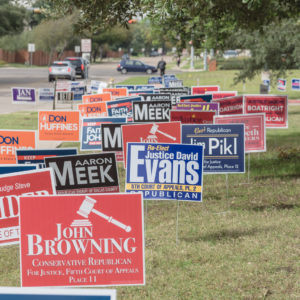To listen to the media, this election is the most important in generations. The media are outdone in their breathlessness only by politicians who proclaim it the most important in history. The election of 2018, really? This election is more important than those surrounding and during the War of 1812, the Civil War, the crash of 1929, the Great Depression, and two world wars? The elections surrounding these events were far more important, and anyone with an ounce of common sense knows as much.
There are two reasons people trot out this foolishness every two years. First, politicians from both sides of the aisle have a vested interest in scaring voters. They will do anything to encourage their respective bases to get to the polls. People who are not frightened are less likely to vote.
Second, and more distressing, is that the American people have come to the erroneous conclusion that politics is the means by which they can solve their problems. From this perspective, every election is the most important one in history precisely because whatever problems voters presently face are, to them, the most important problems that have ever been.
This year, Democrats are working with a “hijacked democracy” narrative, that voting rights are being stolen, money is irreversibly damaging the political process, and the rich aren’t contributing their fair share. Republicans counter, saying that Washington is a swamp that must be drained, there is an invading force from South and Central America poised on our southern border, and today’s judicial appointments will determine policies for generations to come.
Both sides craft their rhetoric to point to one conclusion: The stakes are so high in this election that we must get out to vote. And if your party’s candidate is unpalatable, then get out and vote anyway, because the other party’s candidate is even worse.
The real crime is that people fall for this same tired line every two years. They never seem to realize that, once the election is over, it will be business as usual in Washington. Then, politicians will ignore the voters until the next two-year cycle begins, at which point they will rinse, wash and repeat yet again.
The way to break this cycle is to acknowledge that government is not a panacea. If applied well, government can solve a limited number of specific types of problems. The rest it will solve not at all. Indeed, if applied to problems to which it isn’t suited, government will only create new ones.
Government is a good tool for helping people to live peacefully together, and it is the most effective tool for providing for a limited number of shared needs, like a military, national infrastructure and a justice system. It is decidedly not good at giving people the various and sundry things they want, like retirement benefits, “free” health care, and maybe someday soon “free college.” Economic theory, political theory and centuries of evidence demonstrate that government can be an effective umpire, but is simply not up to playing Santa Claus.
That people want things is not an indication that this, or any election is the most important in our nation’s history. It is just another election. The election rhetoric will frighten people into voting, but they are inclined to believe the rhetoric precisely because they expect more from government than it is capable of delivering.
For proof, consider everything government has ever tried to accomplish, from Social Security, to health care for veterans and the poor, to the war on poverty, to the war on drugs, to balancing the budget, then apply that elusive ounce of common sense. Because when you expect too much, you are bound to be disappointed.

